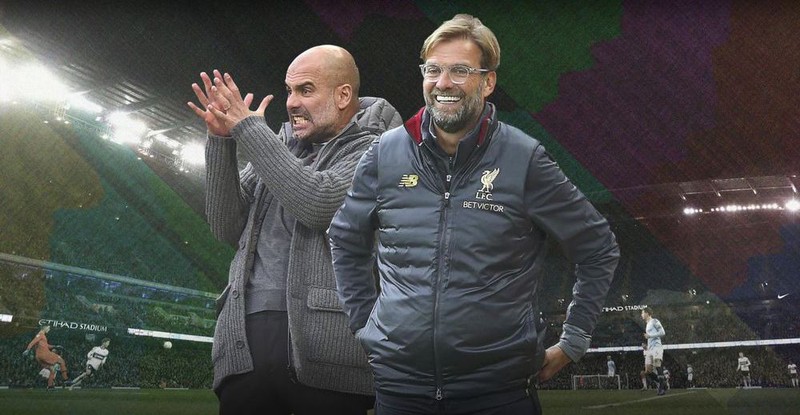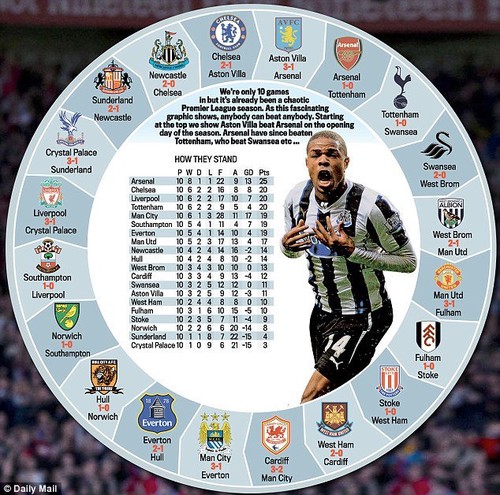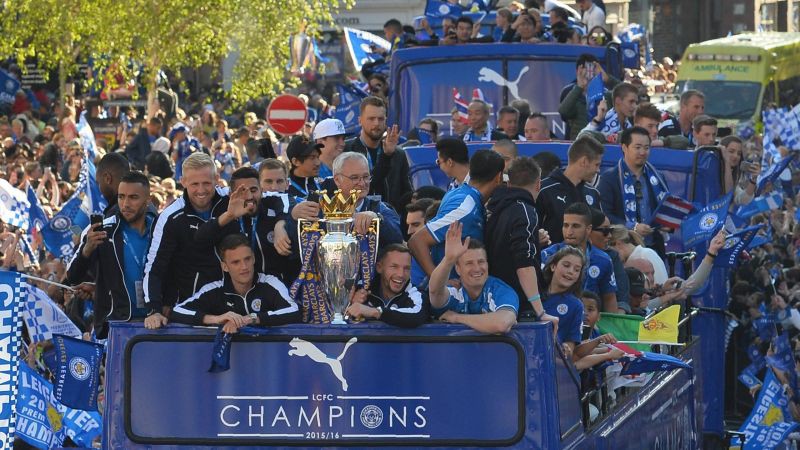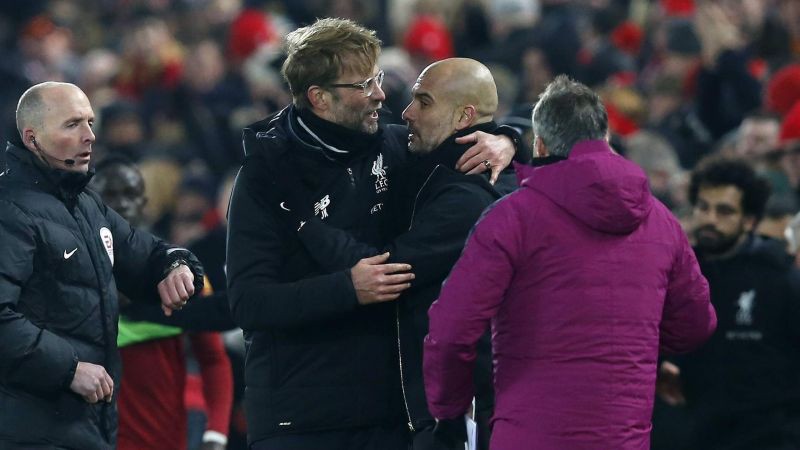Analysis of the main trend of recent years in England.

What is "everyone can beat everyone"?
The incredible competition in the Premier League is interpreted differently, but specifically this phrase can be illustrated in three ways.
The first option is to place all 20 league clubs in one circle, where each team plays each one. This is the most primitive, but the most revealing and precisely the most pop way. It looks nice and clear, but it's very easy to find fault with it. For example, on the graph below is an example from the season 2013/14, where by the tenth round everyone beat each one. Two teams came to the finish line with a hundred goals scored - hardly a sign of the competitiveness of the league.

The second option - to give in to emotions. Their neutral viewer gets after the victory of a clear underdog over a clear favorite. This is pure accessibility heuristics. In fact, outsiders rarely beat tops - otherwise it would not lead to crazy emotions and would be perceived much more easily. To draw large-scale conclusions on one / two / three matches is silly.
Finally, the third option is to calculate the difficulty of passing the distance with grandees. This is the most reasonable way. English tops are less likely to rotate the composition compared to the Spanish, Italian and German - rivals throw them much more serious challenges. All this entails the loss of points and strength - the failures of recent years in European competition are partly due to this.
Why is it in England that everyone can beat everyone?
In the Premier League the fairest income system - there is no significant difference between tops and underdogs. This is naturally transferred to the strength of the squads. Top clubs cannot be purchased by players of the first category every summer - there are very few such players on the market. The middle peasants and outsiders claim to the players of the second and third categories - there are more of them, it is easier and cheaper to sign them. Thanks to a good bench to win grandee easier.
The peak of competitiveness coincided with the Leicester's title. According to the president of Marseille, Vincent Labrune, then the Premier League has become the main league in Europe: “The Premier League is already somewhat reminiscent of the NBA. This is a NBA football. Everyone wants to play there - even for small clubs.”

The wealth of the Premier League allowed the middle peasants to become more attractive in the eyes of players from abroad. Clubs can draw a salary that is clearly beyond the means of underdogs from the Bundesliga, La Liga or Serie A. Tops, on the contrary, compete on equal terms - luring the stars is much more difficult.
What changed?
The success of Leicester was a signal for the giants - they obviously do something wrong. To correct a misunderstanding, the clubs invited better coaches. City signed Pep Guardiola, Chelsea hired Antonio Conte and Maurizio Sarri, United appointed Jose Mourinho. In Liverpool and Tottenham, there were already cool coaches, but both Jürgen Klopp and Mauricio Pochettino received a salary and a project that kept them in England.
The arrival of cool coaches reflected in the transfer market. The clubs have another attractive factor - more players want to work with big coaches. Even the approach itself has changed: City was bought up by young guys (Bernardo, Ederson, Sane), Liverpool only strengthened its weak points (Allison, Van Dijk, Salah), United and Chelsea kept short-term ambitions of coaches in order not to harm long-term plans. Hence the conflicts with Mourinho and Conte.
Thanks to the well-developed personnel policy, the grandees have more opportunities to rotate the team and better cope with the tactical challenges of the EPL. In the league, there are still clubs with a turbo-speed attack (Leicester, Crystal Palace), a rough way of playing (Cardiff, Burnley), unusual schemes (Watford, Wolverhampton) and an extremely closed style (Newcastle, Huddersfield). Dealing with such diversity is now easier.

To some extent, small teams were not ready for revenue growth. Their owners are faced with a dilemma - to stay in the Premier League, but to invite an old-fashioned coach to do so, or to risk with a modern coach, but flirt with the departure and loss of money. Normally, only units can solve it. Most often, an intermediate option is triggered when the club is bought by players under one coach, after a series of defeats invites another and starts the circle again.
Because of this, the Premier League has lost the teams, which in previous years brought the most serious problems to the top clubs. Last season, the league left Swansea, West Bromwich and Stoke. The first ones played great with Arsenal, imposing an identical game on the Gunners. The latter were a nightmare for Liverpool, regularly exposing the weakness of "the Reds” on standards. Still others replayed the giants in a different style - first in rugby (the era of Tony Pulis), then in technical style (the first seasons of Mark Hughes). When Stoke got stuck between the two styles, the team slid down sharply.
How are you doing with it now?
This season, the myth of "everyone can beat everyone" is finally destroyed. In the previous two campaigns, the trend was only gaining defense, now it has reached the design power. To do this, follow the predictions of Arsene Wenger. The Frenchman predicted that in the 2015/16 season, 80 points would be enough for the title, in the 2016/17 season - 82, a year later - already 85. Giants collect more and more points from the underdogs, the competition has intensified, but only at the top.
Clubs from the top-6 had 64 matches with the rest of the teams this season, losing only four. Two defeats at Manchester United account, which generally spends an unconvincing year and, judging by the words of Mourinho, only dreams of getting into the Champions League. Even taking Manchester United in the statistics, it turns out that the grandees lose to the remaining 14 clubs only in every 16th full-time match. In the championship season of Leicester it happened four times more often - every 4.4 games.
At the very top is still more revealing. For the first time in the history of English football, three teams at once (City, Liverpool and Chelsea) passed the starting 12 matches of the top division, without any defeats. In the history of the Premier League there was only one case when two clubs passed this distance without defeat. This season there were three of them.
The dominance of Liverpool and City - beyond any records. After 15 matches, they collectively scored 80 points. For the first two teams - this is the maximum in the era of the Premier League. It is symbolic that the second indicator is last season, when United and City were in the lead.
Real sensations occur when the favorites are executed by an outsider - the success of the middle peasants is also news, but not so bright. After 16 rounds, the seven worst clubs in the Premier League played 35 matches with grandees. Not only did they never win, they scored only three points. Two of them on the account of Crystal Palace, who finished last season in 11th place - that is, in the status of the middle peasants.
By mid-December, only four clubs distinguished themselves: Watford (won by Tottenham Hotspur), Wolverhampton (beat Chelsea), Brighton and West Ham (defeated Man. United). All four victories were mined in their field. On the field giants of the 14 remaining clubs in the Premier League only four draws.
Where now everyone can beat everyone?
It seems to be in Spain, where the problems of the tops coincided with the start of a more equal distribution of income from television broadcasts in the league itself. Barcelona, Real Madrid, Atletico and Sevilla have already lost 32 points against teams from the second half of the table. The loss of the top clubs of the Premier League against all remaining clubs - only 28 points.
The gap between the leader and the 14th league team is also eloquent. Liverpool are 28 points ahead of Cardiff. The advantage of Barcelona over the Eibar is only 13. Sevilla is second in La Liga with 28 points. Even with a discount on the fact that in England more than one match was played, with this indicator the Andalusians would go only sixth in the Premier League. The balance of power is changing.
Comments